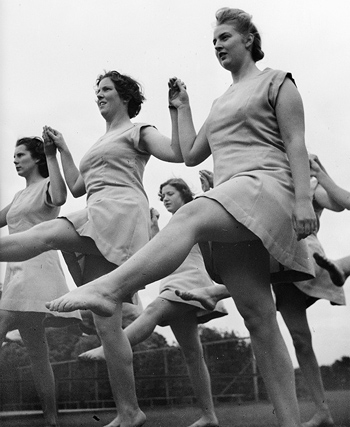He korero whakarapopoto
Children’s sport
The Education Act 1877 said that every school should have a playground. From 1902 physical education was compulsory for public school children over eight years old.
In the 1940s the Department of Internal Affairs employed physical welfare officers who encouraged playgrounds in new suburbs, ran after-school and holiday recreation programmes and fostered links between school leavers and sports clubs.
In 1988 New Zealand’s Hillary Commission started KiwiSport. It promoted simplified forms of sports to inspire children and train them in basic skills. Almost 30 simple forms were developed, from Kiwi cricket to Kiwi judo.
Adult sport
The Physical Welfare and Recreation Act 1937 encouraged sport for adults. A physical welfare branch was set up in the Department of Internal Affairs to coordinate adult fitness programmes around the country.
With the outbreak of the Second World War physical fitness was seen as a national duty. After the war ended the government helped build recreational facilities as war memorials, such as parks and swimming pools.
For a time government support for sport declined. It began again with the Recreation and Sport Act 1973, launching the Ministry of Recreation and Sport.
The Hillary Commission was formed to administer sports grants. In 2003 it was replaced by Sport and Recreation New Zealand, and in 2012 by Sport New Zealand, which gave extra support to seven sports: rugby union, netball, cricket, rugby league, hockey, football and gymsports.
High-performance sport
Unhappy with the government’s limited support for elite sport, a group of businesspeople set up the New Zealand Sports Foundation in 1978. The foundation began to receive funding from the Lottery Grants Board. In 1995 it received the first direct funding from government, focused on the 2000 Olympics.
From 2003 the government offered increasing support to high-performance athletes and teams, usually for specific campaigns. International success was seen as vital to the nation’s prestige.
The government also contributed hundreds of millions of dollars to international sporting events in New Zealand, including the America’s Cup and the 2011 Rugby World Cup.
Politics of sport
From the early 20th century New Zealand’s sporting contacts with apartheid South Africa caused trouble, with the government often called on to either allow or ban events. The tension reached a violent peak in 1981 with nationwide protests against the South African Springbok rugby team’s tour of New Zealand.
The Soviet Union’s military intervention in Afghanistan and the policies of the governments of Israel, Zimbabwe and Fiji also caused sporting boycotts.





